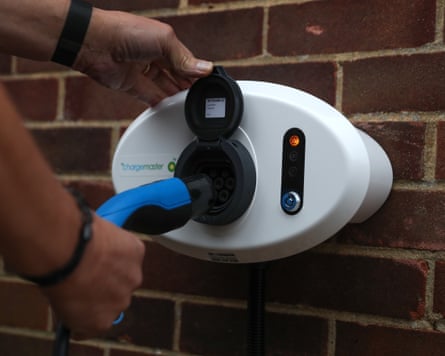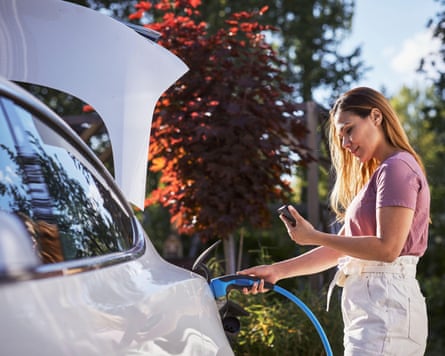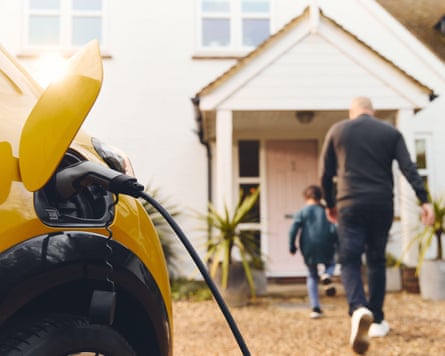When you buy an electric vehicle you need to think about how you will charge it at home. The two main things you will need are a charger and a smart meter.
The kit
While it is possible to charge your car with a standard three-pin plug, the process is extremely slow. Instead, it is best to install a charger – a dedicated AC station that operates at much faster speeds and connects to the vehicle via a cable.
Many home chargers will charge at a maximum rate of 7.4kW, which means a typical EV will be able to do 25-30 miles for every hour it is plugged in.

Auto Express puts the average cost of installing a charger at between £800 and £1,200. Government grants of £350 are available if you rent your home or own a flat with private off street parking or a house that has on-street parking.
You will need a smart meter so that your energy supplier can check your usage throughout the day to apply the correct rates at different times (see below).
Charging is more straightforward for drivers with a driveway or garage than for the 9.3 million households without an off-street parking space. Some local authorities have on-street residential charging points, such as in lamp posts. The government is considering removing the planning permission requirement to install cross pavement ‘gullies’ through which cables run from home to car.
The tariffs
All of the main energy suppliers have at least one EV tariff, which typically allow owners to charge their car at specific times of the day for cheaper rates.
The energy regulator for Great Britain, Ofgem, says people on the default tariff pay an average of 26p a kilowatt hour but many specialist EV tariffs charge less than 8p/kWh at night.

Ben Gallizzi of the comparison site Uswitch says there are different types of deals available for drivers. The “classic” EV tariff allows drivers to charge during a cheap window overnight. For example the British Gas tariff costs 9p/kWh from midnight to 5am; E.ON’s Next Drive is 7.5p/kWh between 12am to 6am and Scottish Power’s EV Saver costs 7.2p/kWh from midnight to 5am.
Then there are intelligent smart tariffs that schedule the car to charge at the cheapest times of the day – such as when demand is lower or when there is more renewable energy on the grid. You plug in your car and tell the system how much charge is needed. It starts charging the car when energy is cheapest. Intelligent Octopus Go, for example, charges 7p/kWh.
A new type of plan on the market is the subscription pack, says Gallizzi. Octopus’s Intelligent Drive Pack offers unlimited smart charging for £30 a month. Ovo’s Charge Anytime starts at £27.50, with a limit of 700 miles of smart charging a month.
Some EV tariffs are only available if you are an existing customer to the supplier. So if you want to avail of a particular tariff, you may have to switch to that provider first on a regular tariff and then move on to the EV tariff.
When assessing which is the best value for your car, Martin Lewis’s MoneySavingExpert site warns that many “two-tier” tariffs, where there are different rates depending on the time, can have peak rates that exceed the price cap along with the attractive night time rates. For example, Intelligent Octopus Go’s day rate is about 29p/kWh while the default tariff is 26p.

There is also the potential for savings through salary sacrifice schemes, where the cost of charging at home is deducted from eligible people’s gross salary before tax and national insurance are taken off. With the Electric Car Scheme’s charge card, employees pay their utility bill and give the mileage to their employer which then gives a reimbursement in the next pay cheque.
How to choose
The best deal will depend on your mileage.
Gallizzi says that long distance drivers should look for the cheapest night rate and the longest charging window. “The goal is to make sure you’re fully charging your vehicle every night so you’re good to go in the morning,” he says. For example, E.ON’s Next Drive Smart costs 6.5p/kWh between midnight and 6am.
For city drivers, smart charging could be the better option, he says. “The system should find the cheapest charging slot for you.” As well as Intelligent Octopus Go, there is also Scottish Power’s EV Optimise tariff, which charges 9p/kWh.

 2 months ago
141
2 months ago
141

















































